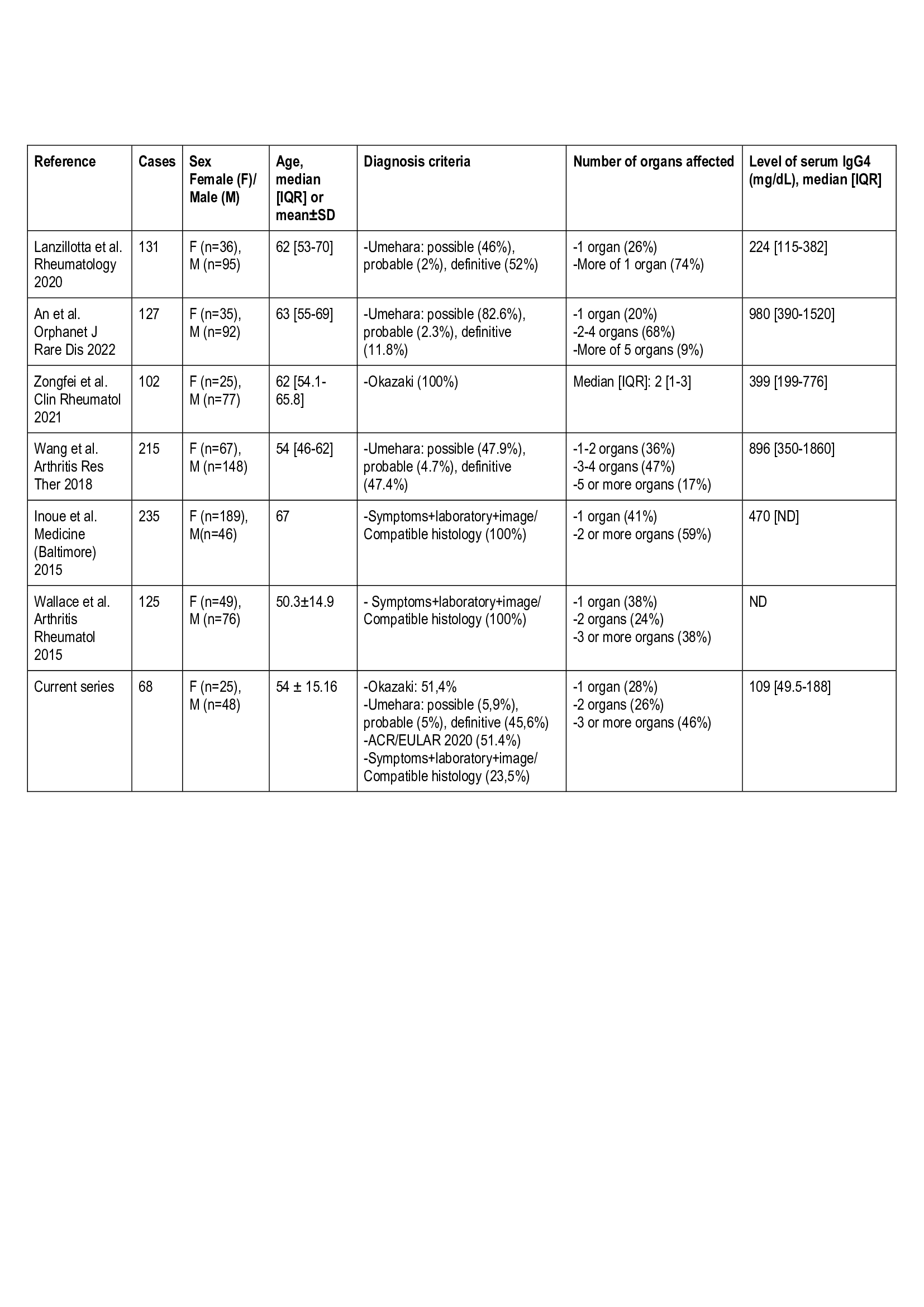Session Information
Date: Sunday, October 26, 2025
Title: (0233–0279) Miscellaneous Rheumatic & Inflammatory Diseases Poster I
Session Type: Poster Session A
Session Time: 10:30AM-12:30PM
Background/Purpose: IgG4-related disease (IgG4-RD) is a systemic fibroinflammatory entity that can involve almost every organ, with characteristic histological features. Its pathogenesis remains poorly understood, clinical features are heterogeneous and unspecific, and recently released classification criteria have poorer performance in early recognition of the disease. Therefore, regrettably IgG4-RD continues to be underdiagnosed. Our objetives were a) To evaluate the clinical characteristics of patients diagnosed with IgG4-RD; and b) to compare it with other large series.
Methods: Observational multicenter study of patients diagnosed with IgG4-RD and literature review. Diagnosis was made accordingly to these criteria: a) Okazaki; b) Umehara; c) ACR/EULAR 2020; and/or d) clinical, laboratory and imaging suggestive findings (1-3). For the literature review, we searched PubMed and the Cochrane library from its inception until 30 November 2024, selecting those series with the largest number of patients.
Results: We studied 78 patients diagnosed with IgG4-RD (48 males/25 females, mean±SD age; 54.4±15 years). The main affected organs were lymph nodes (n=29; 42,6%), retroperitoneum (n=23; 33.8%), kidney (n=18; 26.5%), orbit (n=16; 23.5%), aorta (n=14; 20.5%), lung/pleura (n=15; 22.%), pancreas (14; 20.6%), salivary glands (n=11; 16.1%), ear nose and throat (n=9; 16.6%), lacrimal glands (n=9; 13.2%), , liver/biliary duct (n=11; 16.1%), pachymeninges (n=3; 5.5%), mesenterium (n=2; 3.7%) and other 9 (n=16.6%). IgG4 values were above 135mg/dL in 23 (33,8%) patients (median 109 mg/dL [IQR 49,5-188]). Median values of CRP and ESR were 2.6 mg/dL [IQR 0.77-13.6] and 29 mm/h [IQR 11-56], respectively. In the literature review, 6 series of more than 100 patients each were selected. The main data from the different series are listed in table. The figure shows the most frequently affected organs in the different series. The pancreas and salivary glands were less frequently involved in our series. In contrast, aortic, retroperitoneum and lung/pleura were more frequently involved than in most of the other series.
Conclusion: IgG4-RD is a very heterogeneous disease with involvement of virtually every organ of the anatomy, usually presenting with involvement of more than one organ. Despite the name of the entity, serum IgG4 is not always elevated.References:1. Okazaki K et al. Int J Rheumatol. 2012. PMID: 22690221 2. Umehara H, et al. Mod Rheumatol. 2012. PMID: 21881964 3. Wallace ZS et al. Arthritis Rheumatol. 2020. PMID: 3179325
 TABLE. Main features of the patients with IgG4-RD in series of more than 100 patients and in current series
TABLE. Main features of the patients with IgG4-RD in series of more than 100 patients and in current series
.jpg) FIGURE. Involved organs in series of more than 100 patients and in current series. Data are in %
FIGURE. Involved organs in series of more than 100 patients and in current series. Data are in %
To cite this abstract in AMA style:
Gálvez Sánchez R, Lopez Gutierrez F, Loricera J, Martínez Calabuig P, Fragío Gil J, González Mazario R, Hormigos Martin C, FREITES D, Rodriguez Laguna M, Moya Albarado P, López i Gómez M, Corominas H, Silva-Diaz M, GONZALEZ ARRIBAS G, Garcia-Aparicio A, Font-Urgelles J, Casafont-Solé I, Castañeda e, Merino C, Zas R, Molina-Collada J, Rodríguez Montero S, Melero-González R, Galíndez Agirregoikoa E, Hernández A, Pantoja L, Braña I, Jovaní V, Valls-Pascual E, Mena Vázquez N, Gallego A, Cabaleiro Raña N, Veroz R, Andrés Collado M, Castañeda S, Blanco R. Clinical Presentation of Igg4-Related Disease. Multicenter Study and Literature Review [abstract]. Arthritis Rheumatol. 2025; 77 (suppl 9). https://acrabstracts.org/abstract/clinical-presentation-of-igg4-related-disease-multicenter-study-and-literature-review/. Accessed .« Back to ACR Convergence 2025
ACR Meeting Abstracts - https://acrabstracts.org/abstract/clinical-presentation-of-igg4-related-disease-multicenter-study-and-literature-review/
